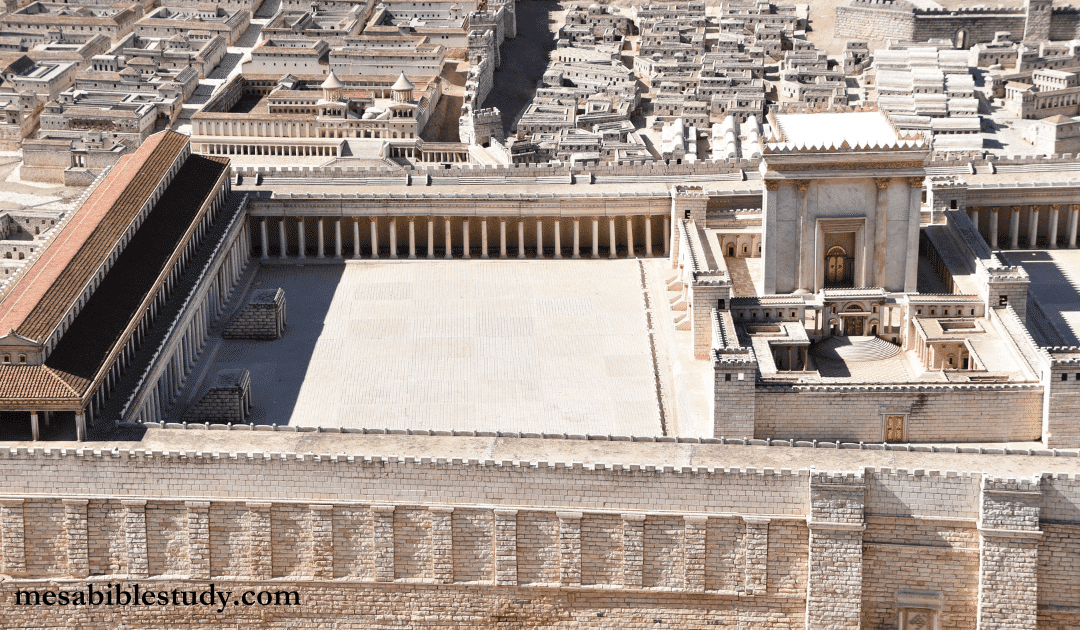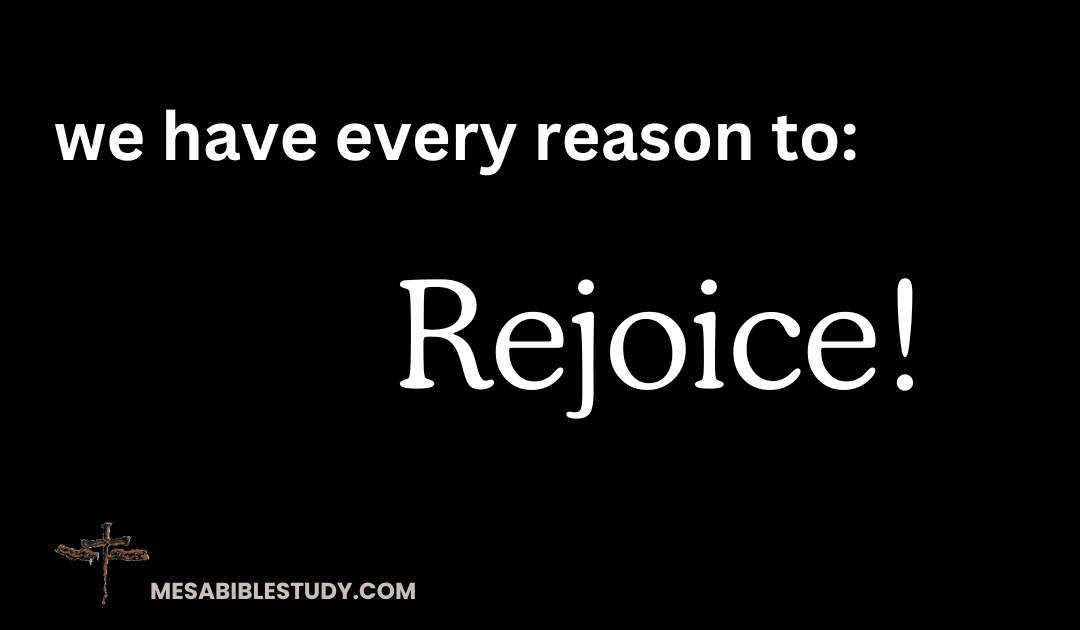
by Jamie Pantastico | Aug 4, 2024 | Daily Encouragement, Devotionals |
Romans 6:6 tells us, ‘knowing this, that our old self (our sin nature we are all born with) was crucified with Him in order that our body of sin might be done away with, so that we would no longer be slaves to sin;’
The Doctrine of Identification is truly mind-boggling. When someone believes the gospel by faith alone, God the Father identifies that person with Christ’s death, burial, and resurrection.
This mindboggling truth means that when we believe the gospel by faith alone, we identify with Christ in His death, burial and resurrection. When Christ hung on the Cross, He died our death. God saw you and me on the Cross. As He laid in the tomb for three days and nights, God saw you and me in that tomb. And when He arose victorious over sin and death, God saw you and me in resurrected life, a new creation (2 Corinthians 5:17).
You don’t get a
Our identification with Christ changes everything. We are no longer slaves to our old sinful nature (the old man), the law which gave sin(s) its power was nailed to the cross. The Lord Jesus fulfilled the law on our behalf. The chains of the law no longer hold us, we are translated from the kingdom of darkness to the kingdom of Christ, we are a new creation. This truth empowers us by the Holy Spirit that indwells us to live victoriously, knowing that our sin (the sin nature), and our sins were crucified, nailed to the cross, our past is buried, and we rise to walk in the newness of life. Amazing…all the glory to God.
Embrace this truth, study it, stand firm in your faith, and trust that God will see you through every trial, filling you with His peace that surpasses all understanding.
Daily Power-up
To deepen your understanding, meditate on these powerful scriptures:
- Old Testament: Isaiah 43:18-19 – “Forget the former things; do not dwell on the past. See, I am doing a new thing!”
- Gospels: John 11:25 – “Jesus said to her, ‘I am the resurrection and the life. The one who believes in me will live, even though they die.'”
- Paul’s Letters: Galatians 2:20 – “I have been crucified with Christ and I no longer live, but Christ lives in me.”
Reflect on these verses, the doctrine of identification is absolutely mind-boggling, our God is an Awesome God.

by Jamie Pantastico | Aug 3, 2024 | Daily Encouragement |
Ezekiel 37:10
“So I prophesied as He commanded me, and breath came into them, and they lived, and stood upon their feet, an exceedingly great army.”
“No cry for the demise of Israel, no matter how loud or persistent, can alter the course set by the Creator of all things. The warning is clear: those who defy God’s warning in Genesis 12:3, those who seek the downfall of the Jewish people, risk being crushed by a force mightier than any in the universe.”
Today, Israel is facing war on six fronts, a conflict it did not initiate. The current hostilities and Israel’s full-scale attack on Gaza are in response to a brutal and unprovoked assault by Hamas against innocent Israeli civilians, resulting in the deaths of 1,200 men, women, and children. Additionally, Palestinian militants, alongside Hamas, took over 160 Israelis hostage, subjecting them to brutal torture. Once again, Israel did not start this conflict.
Since its establishment in 1948, the tiny nation of Israel has been involved in over ten conflicts, with only one being initiated by Israel. Remarkably, despite being vastly outnumbered—sometimes by a factor of over 50 to 1—Israel has emerged victorious time and again. The enemies Israel faces today are the same adversaries it confronted in the Old Testament. Scripture foretells that the whole world will turn against Israel, making Jerusalem “a cup of drunkenness” to all the surrounding peoples (Zechariah 12:2). This imagery suggests that Jerusalem will become an object of intense desire and conflict, leading to the downfall of those who seek to conquer it.
The Wars of Israel (Israel is undefeated BTW)
1. 1948 Arab-Israeli War (War of Independence) Israel Wins!
The 1948 War began following the declaration of the State of Israel. Immediately, neighboring Arab countries, including Egypt, Jordan, Syria, and Iraq, invaded the newly established state, aiming to prevent its formation. This conflict was initiated by the Arab states, not Israel.
2. Suez Crisis (1956) Israel Wins!
The Suez Crisis, also known as the Second Arab-Israeli War, involved Israel, the United Kingdom, and France against Egypt. The conflict erupted after Egyptian President Gamal Abdel Nasser nationalized the Suez Canal. While Israel did invade the Sinai Peninsula, this was part of a tripartite plan and not an independent Israeli initiative to start a war.
3. Six-Day War (1967) Israel Wins!
The Six-Day War stands out as a significant conflict initiated by Israel. Faced with existential threats from Egypt, Jordan, and Syria, and following the closure of the Straits of Tiran (a crucial maritime route for Israel) by Egypt, Israel launched a preemptive strike. This was a strategic move to defend itself against imminent invasion plans by its neighbors.
4. War of Attrition (1967-1970) Israel Wins!
Following the Six-Day War, the War of Attrition primarily involved Egypt’s efforts to reclaim the Sinai Peninsula. It was a prolonged conflict characterized by small-scale but persistent military engagements initiated by Egypt, not Israel.
5. Yom Kippur War (1973) Israel Wins!
The Yom Kippur War began when Egypt and Syria launched a surprise attack on Israel on Yom Kippur, the holiest day in Judaism. The conflict was a coordinated effort by the Arab states to regain territories lost in the Six-Day War. Israel was caught off guard but managed to recover and push back the attackers.
6. Lebanon War (1982) Israel Wins!
The First Lebanon War was initiated by Israel to expel the Palestinian Liberation Organization (PLO) from Lebanon, where it had established a base for launching attacks against Israel. The conflict was a response to ongoing terrorist activities and the aim to secure Israel’s northern border.
7. First Intifada (1987-1993) and Second Intifada (2000-2005) Israel Wins!
These Palestinian uprisings against Israeli occupation in the West Bank and Gaza Strip were marked by widespread protests and violence. They were not initiated by Israel but were responses to ongoing tensions and the complex Israeli-Palestinian conflict.
8. Lebanon War (2006) Israel Wins!
The Second Lebanon War erupted after Hezbollah militants launched a cross-border attack on Israel, capturing two Israeli soldiers. Israel responded with a military campaign aimed at neutralizing Hezbollah’s threat.
9. Gaza Wars Israel Wins!
Over the years, Israel has engaged in several conflicts with Palestinian groups in Gaza, including:
- Operation Cast Lead (2008-2009)
- Operation Pillar of Defense (2012)
- Operation Protective Edge (2014)
- Operation Guardian of the Walls (2021)
These operations were responses to ongoing rocket attacks and terrorism emanating from Gaza, controlled by Hamas.
The Six-Day War: A Preemptive Strike for Survival
Among all these conflicts, the Six-Day War is the most notable instance where Israel took the initiative. The geopolitical climate leading up to June 1967 was tense, with Arab nations surrounding Israel making open threats of annihilation. Egypt’s President Nasser had mobilized troops in the Sinai Peninsula, and Syria and Jordan had also made military preparations. Moreover, the blockade of the Straits of Tiran by Egypt was a severe provocation, as it strangled Israel’s maritime trade routes.
In the face of these imminent threats, Israel decided to strike first. On June 5, 1967, Israel launched a preemptive airstrike against Egyptian airfields, effectively crippling the Egyptian Air Force. This decisive move was followed by swift ground operations, resulting in a stunning victory for Israel. In just six days, Israel captured the Gaza Strip, the Sinai Peninsula, the West Bank, and the Golan Heights, significantly altering the map of the Middle East.
Prophetic Fulfillment and Israel’s Military Prowess
In the pages of Ezekiel and Zechariah, Israel’s prophets foretold the remarkable strength of Israel’s military in the end times. Ezekiel writes of Israel having “an exceedingly great army” (Ezekiel 37:10), while Zechariah likened Israel to a blazing fire among sheaves of grain, consuming neighboring nations (Zechariah 12:6). Even the weakest Israeli soldier, Zechariah proclaimed, would be as formidable as David (Zechariah 12:8).
This remarkable military prowess aligns with the prophetic words of Ezekiel and Zechariah, serving as a testament to the fulfillment of biblical prophecy in our time.
Bible Study:
Ezekiel 37:10
“So I prophesied as He commanded me, and breath came into them, and they lived, and stood upon their feet, an exceedingly great army.”
Zechariah 12:6
“In that day I will make the governors of Judah like a firepan in the woodpile, and like a fiery torch in the sheaves; they shall devour all the surrounding peoples on the right hand and on the left, but Jerusalem shall be inhabited again in her own place—Jerusalem.”
Zechariah 12:8
“In that day the Lord will defend the inhabitants of Jerusalem; the one who is feeble among them in that day shall be like David, and the house of David shall be like God, like the Angel of the Lord before them.”
Conclusion
Israel’s history of warfare is largely characterized by defensive actions in response to existential threats. While it has been involved in numerous conflicts, the Six-Day War remains the only major conflict that Israel is widely recognized as having initiated. Even in this case, the preemptive strike was a strategic necessity born out of a dire need for self-preservation in the face of overwhelming odds. Understanding the context and Satanic driven power behind these wars is essential to grasp the complex dynamics of the Middle East and Israel’s role in it. Furthermore, the alignment of Israel’s military victories with biblical prophecies adds a profound dimension to the faithfulness of God for His chosen people. For believers today we should revel in the sovereignty of our God over all things, and His great love for Israel “the apple of His eye.”
Unshakable Destiny: Israel’s Course Set by the Creator

by Jamie Pantastico | Jul 30, 2024 | Daily Encouragement |
Introduction
In 2 Samuel 7:8-16 (around 1000 BC) God makes a remarkable promise to King David, one that holds significant implications for the future of Israel and the world. This promise goes beyond the construction of a temple or physical structure; it establishes David’s lineage as the royal bloodline from which the King of kings will emerge. The Davidic covenant builds upon the foundation of the Abrahamic covenant, setting the stage for the arrival of the Messiah, Israel’s King and the kingdom in Jerusalem.
The Davidic Covenant
2 Samuel 7:8-16 reads:
“Now therefore, thus shall you say to My servant David, ‘Thus says the LORD of hosts: I took you from the sheepfold, from following the sheep, to be ruler over My people, over Israel. And I have been with you wherever you have gone, and have cut off all your enemies from before you, and have made you a great name, like the name of the great men who are on the earth. Moreover, I will appoint a place for My people Israel, and will plant them, that they may dwell in a place of their own and move no more; nor shall the sons of wickedness oppress them anymore, as previously, since the time that I commanded judges to be over My people Israel, and have caused you to rest from all your enemies. Also the LORD tells you that He will make you a house. When your days are fulfilled and you rest with your fathers, I will set up your seed after you, who will come from your body, and I will establish his kingdom. He shall build a house for My name, and I will establish the throne of his kingdom forever. I will be his Father, and he shall be My son. If he commits iniquity, I will chasten him with the rod of men and with the blows of the sons of men. But My mercy shall not depart from him, as I took it from Saul, whom I removed from before you. And your house and your kingdom shall be established forever before you. Your throne shall be established forever.’”
A Royal Lineage
The promise God makes to David is not about constructing a temple; it is about establishing a royal dynasty, a “house” in the sense of a royal bloodline similar to the house of Windsor (United Kingdom) or the house of Orange (Netherlands). God assures David that from his descendants will come a King who will rule an everlasting kingdom on earth. This promise was made around 1000 BC to David, a Jewish king ruling in Jerusalem, and it sets the theme for all of scripture moving forward into eternity.
The Abrahamic Covenant
This promise to David builds upon the Abrahamic covenant (and Genesis 3:15; “the Seed of the woman), where God promised Abraham that his descendants would become a great nation (the nation of Israel) and that through them all the nations of the earth would be blessed; speaking of Jesus Christ (Genesis 12:1-3). The Davidic covenant narrows this promise down to a specific lineage within Israel—the house of David—from which the Messiah will come.
The Fulfillment in Jesus Christ
Fast forward about a millennium, and we see the angel Gabriel announcing to Mary the fulfillment of this promise in Luke 1:30-33:
“Then the angel said to her, ‘Do not be afraid, Mary, for you have found favor with God. And behold, you will conceive in your womb and bring forth a Son, and shall call His name JESUS. He will be great, and will be called the Son of the Highest; and the Lord God will give Him the throne of His father David. And He will reign over the house of Jacob forever, and of His kingdom there will be no end.’”
The Lord’s first advent partially fulfilled the covenant made with King David in 2 Samuel 7, a thousand years prior. The promised King, Israel’s Messiah, was among His people. However, the nation of Israel, as a whole, rejected Jesus as their Messiah, leading to His crucifixion. This rejection, however, does not nullify God’s promise. It did not catch God off guard; He knew of Israel’s rejection through His foreknowledge (Acts 2:23). In response, God paused the tribulation, temporarily blinded Israel, and saved Saul, a religious zealot, a Pharisee of the Pharisee’s, who persecuted the church and hated the name of Jesus. Renaming him Paul, God appointed him as the apostle to the Gentiles (Romans, revealing new revelations that had been hidden in the mind of God. God reveals to Paul alone that now He is opening the floodgates of heaven, pouring out His grace offering the free gift of salvation to all humanity—Jews and Gentiles alike—by grace through faith alone in the death, burial, and resurrection of Jesus, apart from the law, Israel, and temple worship. This “gospel of the grace of God” (1 Corinthians 15:1-4) has been the means of salvation for nearly 2,000 years and will continue until the “fullness of the Gentiles” (Romans 11:25) is complete. After this, God will rapture the Church, the body of Christ, and return to His prophetic program with Israel, culminating in His return (Matthew 23:37-39) and the establishment of His long-anticipated kingdom (Isaiah 11:1-9).
Conclusion
The promise God made to King David in 2 Samuel 7:8-16 is a cornerstone of God’s prophetic plan, establishing a royal lineage culminating in Jesus Christ, the King of kings, ruling and reigning from David’s throne in Jerusalem. This promise, rooted in the Abrahamic covenant (and Genesis 3:15; “the Seed of the woman”), underscores ‘…the depth of the riches both of the wisdom and knowledge of God! How unsearchable are His judgments and His ways past finding out (Romans 11:33).’ Though Israel initially rejected their Messiah, the promise remains, and Jesus will one day return to establish His everlasting kingdom, ruling from Jerusalem. With the nation of Israel as the top nation above all nations, no longer the tail but the head. As believers, we can take comfort in God’s unwavering promises made to the Jewish people and look forward to the fulfillment of His eternal kingdom.

by Jamie Pantastico | Jul 29, 2024 | Daily Encouragement, Devotionals |
Rejoice! Our God is truly awesome—sovereign over all things, mighty, and majestic. He intercedes for us as our Advocate before the Father, a thought that should fill us with awe. Imagine, at this very moment, God the Son is advocating for us, defending us against the accusations of Satan before God the Father. Our salvation is Secure.
Psalm 104:1 captures the majesty of our Lord: “Bless the Lord, O my soul! O Lord my God, You are very great: You are clothed with honor and majesty.” This verse reminds us to praise God for His greatness and sovereignty. Hebrews 1:10 further highlights His creative power: “And: ‘You, Lord, in the beginning laid the foundation of the earth, And the heavens are the work of Your hands.'” God the Son, Jesus our Lord, spoke the words and created the universe, underscoring His supreme authority and control over all creation.
In Isaiah 45:12, God declares, “I have made the earth, And created man on it. I—My hands—stretched out the heavens, And all their host I have commanded.” This verse reaffirms that everything exists by His command and power.
For believers, the safest place to be is in Christ. As Colossians 3:3 tells us, “For you died, and your life is hidden with Christ in God.” This verse assures us of our secure position in God’s care, protected from all harm. Even when we fall short, 1 John 2:1 offers comfort: “My little children, these things I write to you, so that you may not sin. And if anyone sins, we have an Advocate with the Father, Jesus Christ the righteous.” Jesus stands as our righteous Advocate, interceding on our behalf before God when Satan comes before God the Father when we sin.
Romans 8:35 should bring hope and joy to believers when they believe God’s answer to: “Who shall separate us from the love of Christ? Shall tribulation, or distress, or persecution, or famine, or nakedness, or peril, or sword?” The answer is nothing— ‘Yet in all these things we are more than conquerors through Him who loved us. For I am persuaded that neither death nor life, nor angels nor principalities nor powers, nor things present nor things to come, nor height nor depth, nor any other created thing, shall be able to separate us from the love of God which is in Christ Jesus our Lord.’
The culmination of it all is the gospel (1 Corinthians 15:1-4); because our faith alone in the finished work of the cross we are not just saved from hell fire but we have victory now! Read on…from I Corinthians 15:55-57:
‘“O Death, where is your sting? O Hades, where is your victory?” The sting of death is sin, and the strength of sin is the law. But thanks be to God, who gives us the victory through our Lord Jesus Christ.’
Rejoice, give thanks and praise Him.

by Jamie Pantastico | Jul 21, 2024 | Daily Encouragement, Devotionals |
As believers, we live and navigate in an ungodly world filled with temptations and sin. Daily immersion in God’s Word is crucial for our spiritual cleansing, staying aligned with His will, and ongoing sanctification. This post looks at the importance of studying the Bible daily, using Psalm 119:9, John 13:4-10, and Ephesians 5:26 to highlight the necessity of this practice.
Let’s commit to making daily Bible study a non-negotiable part of our lives.
Psalm 119:9 – Keeping Our Way Pure
Psalm 119:9 asks, “How can a young man cleanse his way? By taking heed according to Your word.” This verse underscores the importance of God’s Word in guiding us toward purity.
Regular engagement with Scripture keeps us focused on God’s will for us, helping us resist the temptations and impurities that bombard us daily.
John 13:4-10 – Jesus Washes the Disciples’ Feet
In John 13:4-10, Jesus washes His disciples’ feet, symbolizing the need for daily cleansing. Jesus tells Peter, “He who is bathed (saved) needs only to wash his feet, but is completely clean; and you are clean, but not all of you (speaking of Judas).”
This passage clarifies that, while our salvation is secure, we still need cleansing from the sin and temptation we encounter daily. By immersing ourselves in Scripture daily, we allow the Word (the Lord Jesus; John 1:1) to cleanse us continually.
Ephesians 5:26 – Sanctification Through the Word
Ephesians 5:26 speaks of Christ sanctifying the church, “that He might sanctify and cleanse her with the washing of water by the word.”
This verse highlights the ongoing process of sanctification, which involves being purified and set apart for God’s purposes. Daily Bible study is essential for this process, as it renews our minds and transforms us to be more like Christ.
The Necessity of Daily Bible Study
These passages collectively emphasize that daily Bible study is vital for spiritual health. It cleanses us from the filthy ungodly world around us, aligns us with God’s will, and advances our sanctification. Just as our physical bodies need regular washing, our spirit requires daily cleansing through God’s Word.
Number one when it comes to Bible study is to be consistent
Set a Specific Time: Dedicate a specific time each day for Bible study. Consistency is key to forming a lasting habit.
Conclusion
In our daily walk as believers, we must recognize the importance of daily cleansing through God’s Word. Psalm 119:9, John 13:4-10, and Ephesians 5:26 remind us that while our salvation is secure, we need continual cleansing. By studying the Bible daily, we cleanse ourselves from the world’s filth, stay in alignment with God’s will for us, and progress in our sanctification. Let’s commit to making daily Bible study a non-negotiable part of our lives.
Prayer
Father, thank You for the gift of Your Word. Help us to commit to daily study, allowing Your truth to cleanse, guide, and sanctify us. Strengthen us to resist the temptations of this world and walk in Your will. Amen.
Daily Power-Up
Reflect on these passages today and consider how you can incorporate more time in God’s Word into your daily routine. Remember, consistent study leads to spiritual strength and growth. Here are a few verses that fit right into the absolute necessity of studying God’s word.
‘Finally, my brethren, be strong in the Lord and in the power of His might. Put on the whole armor of God, that you may be able to stand against the wiles of the devil. For we do not wrestle against flesh and blood, but against principalities, against powers, against the rulers of the darkness of this age, against spiritual hosts of wickedness in the heavenly places. ‘
Ephesians 6:10-12
‘All Scripture is given by inspiration of God, and is profitable for doctrine, for reproof, for correction, for instruction in righteousness,
II Timothy 3:16
‘Study to shew thyself approved unto God, a workman that needeth not to be ashamed, rightly dividing the word of truth.’
2 Timothy 2:15
‘For whatsoever things were written aforetime were written for our learning, that we through patience and comfort of the scriptures might have hope.’
Romans 15:4




